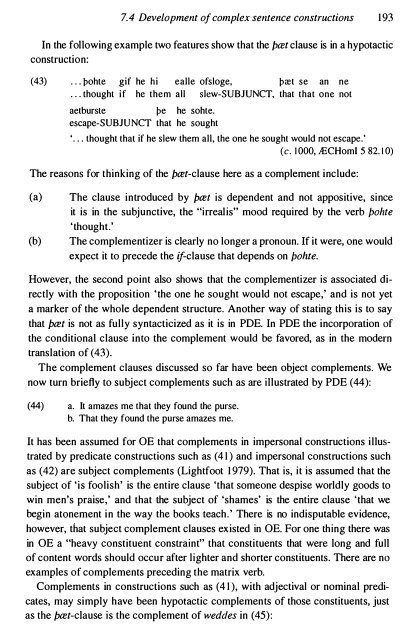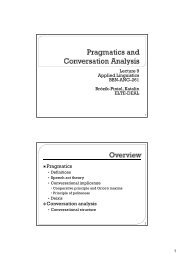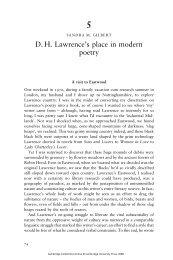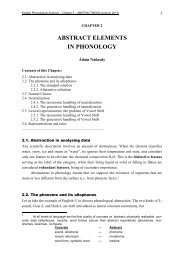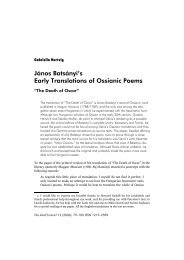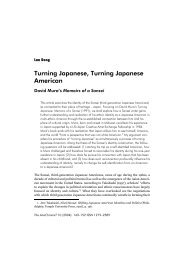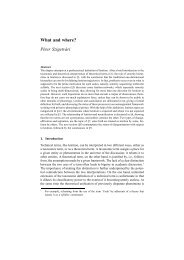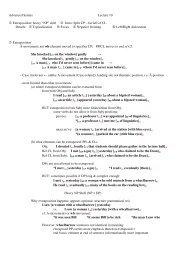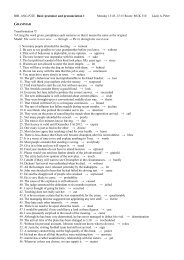Gram - SEAS
Gram - SEAS
Gram - SEAS
You also want an ePaper? Increase the reach of your titles
YUMPU automatically turns print PDFs into web optimized ePapers that Google loves.
7. 4 Development of complex sentence constructions 193<br />
In the following example two features show that the fxet clause is in a hypotactic<br />
construction:<br />
(43) ... pohte gif he hi ealle ofsloge, pret se an ne<br />
... thought if he them all slew-SUBJUNCT, that that one not<br />
aetburste pe he sohte.<br />
escape-SUBJUNCf that he sought<br />
' . .. thought that if he slew them all, the one he sought would not escape.'<br />
(c. 1000, JECHoml 5 82. 10)<br />
The reasons for thinking of the fxet-clause here as a complement include:<br />
(a) The clause introduced by fxet is dependent and not appositive, since<br />
it is in the subjunctive, the "irrealis" mood required by the verb /Whte<br />
'thought.'<br />
(b) The complementizer is clearly no longer a pronoun. If it were, one would<br />
expect it to precede the if-clause that depends on /Whte.<br />
However, the second point also shows that the complementizer is associated di<br />
rectly with the proposition 'the one he sought would not escape,' and is not yet<br />
a marker of the whole dependent structure. Another way of stating this is to say<br />
that fxet is not as fully syntacticized as it is in POE. In POE the incorporation of<br />
the conditional clause into the complement would be favored, as in the modern<br />
translation of (43).<br />
The complement clauses discussed so far have been object complements. We<br />
now turn briefly to subject complements such as are illustrated by POE (44):<br />
(44)<br />
a. It amazes me that they found the purse.<br />
b. That they found the purse amazes me.<br />
It has been assumed for OE that complements in impersonal constructions illus<br />
trated by predicate constructions such as (4 1) and impersonal constructions such<br />
as (42) are subject complements (Lightfoot 1979). That is, it is assumed that the<br />
subject of 'is foolish' is the entire clause 'that someone despise worldly goods to<br />
win men's praise,' and that the subject of 'shames' is the entire clause 'that we<br />
begin atonement in the way the books teach.' There is no indisputable evidence,<br />
however, that subject complement clauses existed in OE. For one thing there was<br />
in OE a "heavy constituent constraint" that constituents that were long and full<br />
of content words should occur after lighter and shorter constituents. There are no<br />
examples of complements preceding the matrix verb.<br />
Complements in constructions such as (4 1), with adjectival or nominal predi<br />
cates, may simply have been hypotactic complements of those constituents, just<br />
as the fxet-clause is the complement of weddes in (45):


